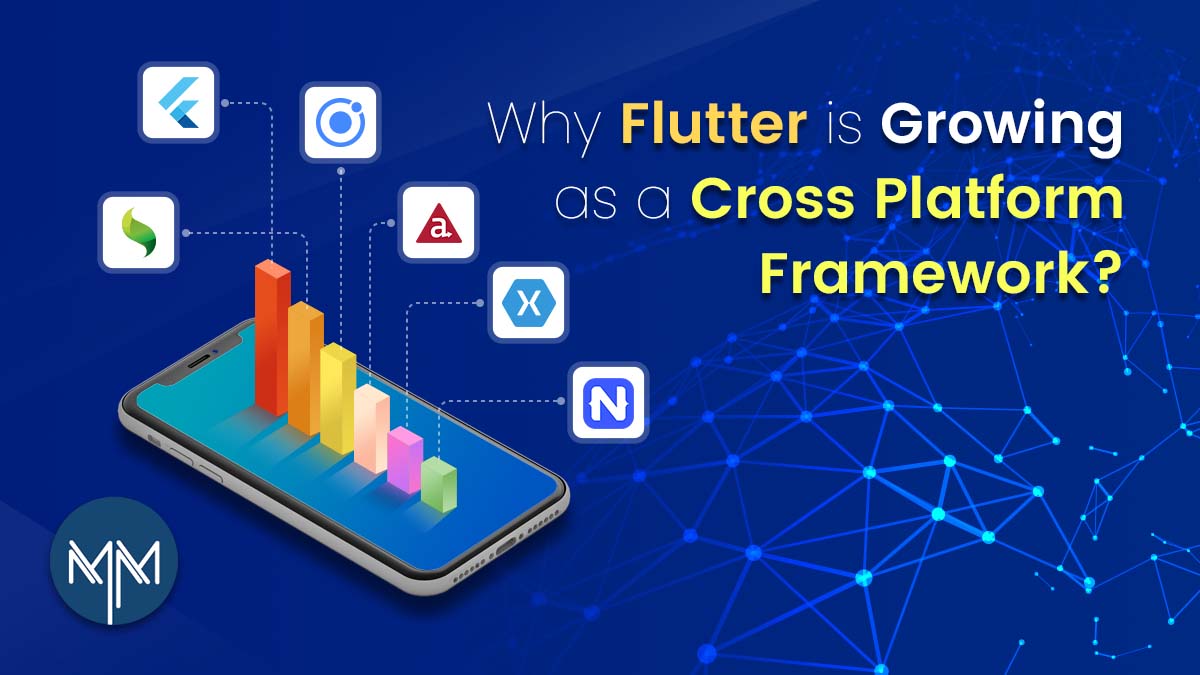Why Flutter is growing as cross-platform framework?
Smartphone applications have become an integrated part of our daily life. All our daily activities revolve around the usage of these apps. With the rising popularity of the apps, developers are now dependent on multiple platforms.
The discussion in the current article will be on Flutter, which is the platform developed by tech-giant Google. In just five years of its inception in 2017 Flutter, today is the most popular cross-platform development framework. According to report of Statista nearly 42% of app developers used Flutter as their preferred platform.
For the feature of code reusability that allows developers to use the same codebase to build apps for android and iOS, Flutter has overtaken React Native. However, it is not just the versatile nature of Flutter that has helped it to be the most popular development program. Now, we are going to explore more about Flutter and the reasons for it being the most popular Cross-platform.
- Open-Source Platform: The most vital benefit of being an open-source platform is that anyone can use the same for development without any payment. Google has also given access to the insight concept of Flutter that has helped to increase the size of the Flutter community. Google also ensures maximum support to the community by providing regular updates to fix all forms of bug issues.
- Multi-Platform Support: With Flutter it is possible to develop solutions for many platforms like mobile, web apps and even desktops. The same code is usable for the development of all apps on multiple platforms.
- Use of Widgets: Like any other progressive language, widgets are also one of the core elements of Flutter. Developers can preview their work almost immediately with the help of widgets and it saves them time for testing the high-end features. There are two types of widgets in the Flutter system, stateless and state-full. The former remain static in every situation while the state-full widget can auto-detect the state and modify the layout. Flutter also allows developers to have custom widgets, which has proven to be effective in adding high-end features.
- Convenient lifecycle management: With the help of Stateful widgets it is now possible for developers to see their app’s lifecycle. This helps them to track changes in various aspects of app development. Hence, Flutter offers high-level clarity to users
- Gamification: The gamification features allow an app to have gaming like elements over any traditional app. Gamification aims to enhance the overall usability of the app and gain greater user engagement. It is possible to add the gamification process in any native app. Nevertheless, with the widgets in the Flutter framework, it is possible to add gamification features much more conveniently.
- Faster Market Delivery: Flutter offers multiple features that allow instant changes in the app usage by fast-changing code. The designers as well as backend developers can monitor the real-time changes. Hence, it is now possible to speed up the entire process of developing and launching an app in the market with less deployment time.
- Cost-effective Development: This feature makes Flutter the most popular choice, especially among small and medium scale business owners with a limited budget. Flutter delivers Native mobile applications, with a cross-platform codebase. So, it is very cost-effective in delivering Native apps on both Android & iOS platforms. Also, due to its Native nature, Flutter is highly scalable.
- Support of Google: This is another reason for choosing Flutter, by most of the app developers. With Google’s community support, it is possible to get regular updates with new innovative features. With a high fan base of Goggle, it is also possible to have a larger community, where developers can get all types of guidance from people all across the globe.
- Support Multiple IDEs: For the wide network, flutter can be compatible with multiple IDEs (Integrated Development Environments) that includes Visual Studio, Android studio, Codemagic etc. With dedicated plugins for each IDEs, Flutter allows you to write code in any specific way and personalize the same.
Overall, with the easy usability and being a more efficient platform, it is no doubt that Flutter is currently, the most popular cross-platform for app developers. It is easy to learn as it is open-source, which makes it easily accessible for even the newcomers with a limited budget.
To use all the advantages of Flutter contact our app development experts.


 October 18, 2022
October 18, 2022

